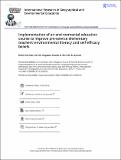DSpace Repository
Implementation of an environmental education course to improve pre-service elementary teachers' environmental literacy and self-efficacy beliefs
- DSpace Home
- →
- Web Of Science
- →
- Web Of Science
- →
- View Item
JavaScript is disabled for your browser. Some features of this site may not work without it.
| dc.contributor.author | Saribas, Deniz
|
|
| dc.date.accessioned | 2024-04-25T06:59:31Z | |
| dc.date.available | 2024-04-25T06:59:31Z | |
| dc.date.issued | 2017 | |
| dc.identifier.issn | 1038-2046 | |
| dc.identifier.uri | http://hdl.handle.net/11547/11595 | |
| dc.description.abstract | In this study, a dataset of 663,549 lung computed tomography (CT) scans was analyzed using Deep Learning and Uncertainty Measures to determine the existence of lung cancer in patients and, if present, the benign or malignant nature of the cancer. The dataset was divided into three groups: 80% for training, 10% for testing, and 10% for validation (Figure A).Purpose: The study proposes two methods, with and without using Uncertainty Quantification, and proposes a new 4-layer Convolutional Neural Network model.Theory and Methods: This scientific study used a dataset of 663,549 lung CT scans, split into 80% for training, 10% for testing, and 10% for validation. Two methods for detecting lung cancer in the scans were proposed. The first method employed four pre-trained neural network models (ResNet50, AlexNet, Inception v3, and VGG16) to predict cancer accuracy without utilizing Uncertainty Quantification. Results: The study also proposed a new 4-layer Convolutional Neural Network model, which achieved an accuracy rate of 0.971. When Uncertainty Quantification was used, the Bayesian Neural Networks ResNet50 model achieved an accuracy rate of 0.89, the Bayesian Neural Networks AlexNet model achieved an accuracy rate of 0.86, the Inception v3 model achieved an accuracy rate of 0.91, and the VGG16 model achieved an accuracy rate of 0.77.Conclusion: This study proposed two methods to improve lung cancer diagnosis accuracy using CT scans by combining Deep Learning with Uncertainty Quantification. The methods achieved high accuracy rates, demonstrating the potential of using Uncertainty Quantification to improve neural network models for lung cancer diagnosis, ultimately improving patient outcomes. | tr_TR |
| dc.language.iso | en | tr_TR |
| dc.relation.ispartofseries | 24;4 | |
| dc.subject | CLIMATE-CHANGE | tr_TR |
| dc.subject | STUDENTS | tr_TR |
| dc.title | Implementation of an environmental education course to improve pre-service elementary teachers' environmental literacy and self-efficacy beliefs | tr_TR |
| dc.type | Article | tr_TR |
Files in this item
This item appears in the following Collection(s)
-
Web Of Science [1012]
